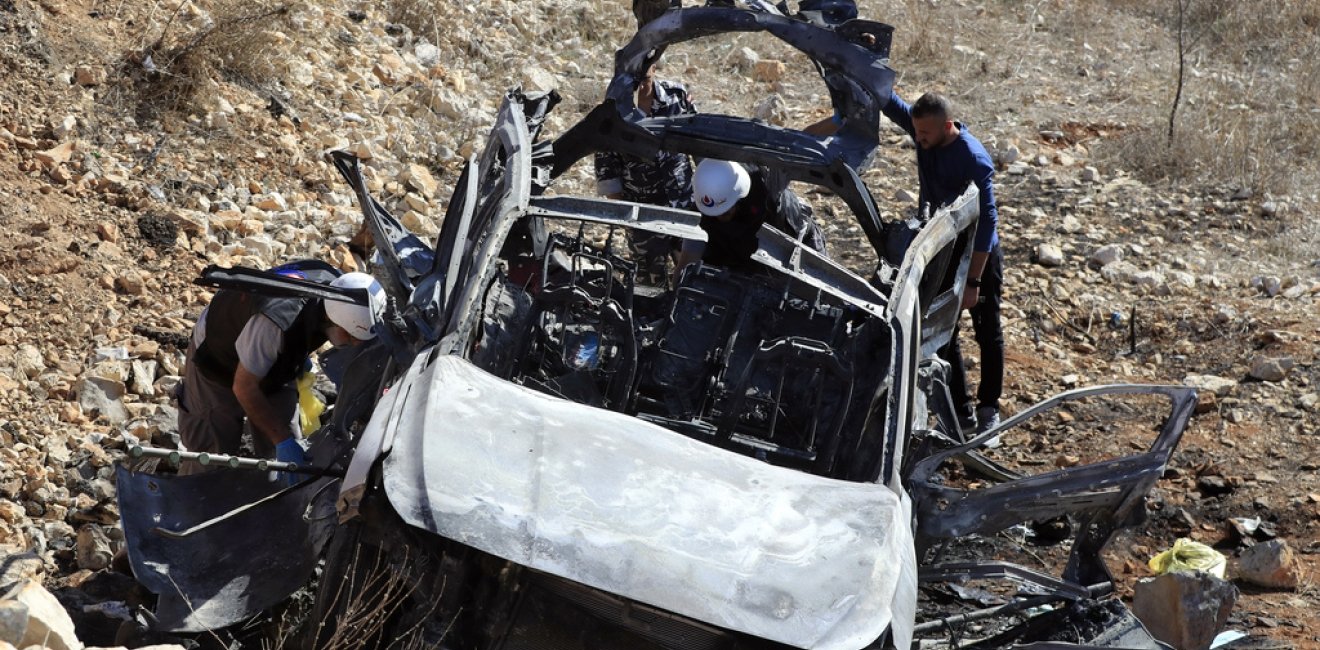Notwithstanding the painful casualties it is suffering, Israel's Defense Forces, responding to the unparalleled carnage perpetrated by Hamas on October 7, are plowing ahead in a systematic campaign to eradicate the terrorist organization’s fighting capabilities in the Gaza Strip. They are pinning hope on attaining the rather elusive goal of victory, widely interpreted to mean permanently arresting Hamas' sinister path, while in the process, restoring the broken sense of security in Israel’s deeply traumatized society, and deterring Hezbollah from further escalation.
Hamas, for its part, is not only fighting back locally while holding on to hundreds of Israelis (including many elderly, women, and children) it kidnapped on that "Black Saturday" but also sustaining its rocket attacks against Israeli cities. Meanwhile, the international humanitarian relief effort to ease some of the pains of the war imposed on Gaza’s civilians is finally gathering steam, while still struggling to overcome various military and political obstacles. Mesmerizing as these local developments are, they run the risk of obscuring the alarming broader picture of the chain of events unleashed by this war.
Israel and its Arab neighbors
Some events are evident in Israel itself. Mass military mobilization alongside evacuation of populations from the cities and towns along the Gaza Strip as well as the Lebanese border, is superimposed on the precautions put in place to withstand incessant rocket and missile attacks on Israel. Together they are causing an unprecedented level of disruption to daily life as well as rapidly mounting economic and social toll. Further complicating the situation are the intensifying and more aggressive attacks against Israel launched by Iran's proxies, most prominently from Lebanon (Hezbollah) and Yemen (the Houthis). Unrest in the West Bank fomented by pro-Hamas Palestinian terrorism and sustained provocations by extreme Jewish settlers is adding to the mix. Both are trying to undermine the rather reassuring picture of Arab Israeli co-existence that has largely withstood the extreme test unleashed by the October 7 events.
The current Israeli government, not very able in the best of times, is stuttering in its efforts to manage the situation.
The current Israeli government, not very able in the best of times, is stuttering in its efforts to manage the situation. It is suffering from an acute legitimacy deficit (having failed to prevent the catastrophe) and profound internal discord impairing its capacity to implement coherent policies to mitigate some of the debacle's worst domestic consequences. Predictably it is also struggling to articulate a viable plan for post-conflict Gaza. The frantic outcry from the heartbroken families of those kidnapped by Hamas, fearing for the lives of their loved ones, is besieging the government even further. This inevitably encroaches on its freedom of maneuver to expand humanitarian efforts (aimed at relieving the worsening plight of Gaza’s residents) before the hostages held by Hamas are freed.
Looking more broadly, the picture appears even bleaker. The first-order reverberations of the war are now being felt throughout the Middle East. Two neighboring Arab states, Jordan and Egypt, feel especially close to the front lines. Both fear that Palestinians either fleeing from Gaza (Egypt) or rising in protest (Jordan) will upend their domestic stability. Scurrying to dampen tensions, they appeal to Israel and the US to step up the humanitarian efforts in Gaza, scale back the Israeli military operation there, and promote a more benign settlement in Gaza and between Israel and the Palestinians.
Iran, Russia, and the World
Conversely, Iran is vigorously striving for the opposite result, actively pushing its proxies in Lebanon, Yemen, Iraq, and Syria to attack Israeli and US targets throughout the region. Numerous such provocations have been occurring in recent days. Predictably, Erdogan's Turkey is also venturing into the fray, adding its own inflammatory rhetoric to the toxic fumes already available in abundance. Israel and the US are thus far largely containing themselves with modest retaliation to these provocations, stepping up their public relations and diplomatic efforts, while dramatically beefing their military preparedness to dissuade any attacks on their citizens in the region as well as to deter any further escalation by Iran and its proxies. But a fuse has been lit that might not be possible to extinguish before a bigger explosion occurs.
Moscow and Tehran have not only embraced Hamas leaders but also conducted a massive diplomatic and public relations campaign in their support.
Worryingly, Russia sees here an opportunity to advance its strategic interests by shortening the regional fuse. By defending Hamas and siding with Iran, Putin aims to further inflame and leverage the crisis to undermine the US-led western front aligned against it, especially over Ukraine. Russia thus foments, under the guise of supporting the Palestinian cause, a virulent anti-Western (and anti-Israeli) campaign, unashamedly lumping together Israel and Ukraine as part of the pro-Nazi western conspiracy aligned against it. Moscow and Tehran have not only embraced Hamas leaders but also conducted a massive diplomatic and public relations campaign in their support. Worse still, Russia is now reportedly contemplating "Wagner group" military assistance to Hezbollah.
Zooming out even further, it is now apparent that the Gaza conflict is fueling intense emotions overseas, not least in Europe and the United States. These are already manifesting in a clash between pro-Israeli and pro-Palestinian rhetoric, rallies, and radicalization. Most worrisome seems to be the ensuing slide towards extreme acts of antisemitic and (lesser in scope but no less alarming) Islamophobic violence, especially in mixed communities. Highly virulent political rhetoric, most prominently articulated by former President Trump, is further exacerbating tensions, adding highly partisan fuel and flavor to the fire. Even more remote bystanders in Latin America, are reacting to the crisis by either recalling their ambassadors to Israel (Chile and Colombia, Honduras) or severing diplomatic ties altogether (Bolivia).
Dousing the Flames
We clearly need some time and detachment to digest how this dynamic has come about and assess its broader implications. But until we can calmly engage in such an intellectual endeavor, our immediate duty is to consider how to arrest the prospects of further escalation in the region and beyond. The most promising avenue for doing so lies in a combination of four efforts that would simultaneously diminish the local sources of fuel for the fire, while also undermining the transmission belts spreading its toxic fumes further afield.
Our immediate duty is to consider how to arrest the prospects of further escalation in the region and beyond.
First, a stepped-up humanitarian effort to ease the predicament of innocent bystanders in Gaza and Israel. This would require Israel to endorse proposals for a brief pause in the fighting, while creating humanitarian corridors, and a greater effort to provide the displaced residents of Gaza with basic supplies, medical care, and temporary shelter. The pause would have to be linked to a final effort to secure a “prisoner” swap that would have Hamas release not only foreign and dual nationals but also all its Israeli hostages in return for Palestinian prisoners held by Israel. And would provide Israel with greater legitimacy to sustain for a while longer its military campaign against Hamas militants and infrastructure in the Gaza Strip.
A second avenue we ought to vigorously pursue in parallel is to rapidly develop the contours of an Arab-led post Hamas regime for Gaza. The goal would be to bring together local forces (most prominently Egypt, Saudi Arabia, Jordan, and the Palestinian Authority) and international supporters (primarily the US and the EU) to urgently supplant the Israeli military presence there. Such an arrangement should not only provide a framework for a local Gaza regime genuinely prioritizing relief and reconstruction, but hopefully also pave the way for progress toward a two-state solution for Israel and Palestine. In the interim, Israel would have to clamp down much harder on provocations by Jewish extremists in the West Bank.
The third complementary course of action involves a US-led effort to arrest the escalatory spiral in and from the region by bolstering deterrence against Iran and its proxies. Defensive assets backed by offensive capabilities should be enhanced to dissuade Iran (with Russian encouragement) from unleashing its proxies against Israeli, US, and other Western targets and allies in the region. A concerted diplomatic effort to force effective implementation of UN Security Council resolution 1701 would greatly diminish the threat Hezbollah poses to Israel as well. And would be indispensable for Israel to regain the trust of its population so that the state can effectively protect them from mighty Hezbollah's periodic life-threatening provocations.
Finally, a full-blown campaign is also required to prevent the strong sentiments the conflict evokes from triggering violence in and against the West. Homeland intelligence, law enforcement, and passive security measures to safeguard potential targets and crack down on extremists of all types are necessary but insufficient here. The same applies to diplomacy. Inevitably, these must be accompanied by unprecedented efforts by the government and the private sector to contain the spread of virulent messaging, especially online. It perhaps represents the most daunting challenge for Western democracies, given their firm commitment to free speech.
The chain reaction started by Hamas has now ignited a powder keg threatening to engulf the Middle East and spread far beyond. It is not too late to avert a worst-case scenario, but success hinges on taking a series of urgent, simultaneous steps that, at a minimum, defuse the initiators that could trigger the explosive charges now so widely scattered.
The views expressed in this article are those of the author and do not express the official position of the Wilson Center.






